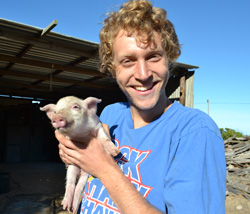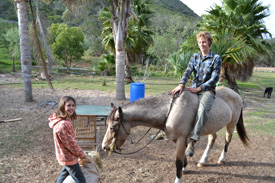Jacob Rutz ’14 has a passion for soil. He aspires to be both a farmer and a community food organizer in the future, and wants to teach others about creating global sustainability and organic farming processes. Rutz was able to combine these passions by joining the Worldwide Opportunities on Organic Farms (WWOOF) program in two locations in South Africa this past summer.
Rutz, a senior majoring in plant and soil science with a concentration in agroecology, spent the semester prior to his summer WWOOF program studying in Namibia. He was drawn to southern Africa because of both the social unrest and progress occurring in the region. He says the program allowed him to explore these themes in depth draw connections between them and his studies.
“This experience allowed me to delve into cultures strikingly different than my own while working with illegal immigrant laborers, diversified products bases and exploring new landscapes,” Rutz said.
Rutz was in the Western Cape region for approximately three months during his stay with the WWOOF program. The first farmers with whom he stayed provided Rutz food and shelter, in return for work on their farm. Rutz says his hosts taught him about how to run a diverse enterprise in a country facing sociopolitical tensions.
At Milkwood Rest, the second farm where Rutz stayed, he was immersed in every aspect of his host family’s life. He helped prepare a winter garden, tend a herd of pigs, build with cob, and served as a counselor and caretaker for the family’s three young children.
Most rewarding for Rutz were the moments when he felt the work he and his fellow volunteers were doing truly enriched the lives of others. During his stay at Milkwood Rest, for example, Rutz helped clear a space for a soccer field. His host family then invited the local children to play on the field, and Rutz says it was spectacular to play soccer with them on a field he’d had a hand in creating.
“It was an awakening experience, forcing me to contemplate two universal truths of everyday life,” said Rutz. “That biologically active soil fertility yields the best substances, and that empathy is necessary for community.”
When asked what advice he would give to students seeking experiences to promote the organic farming movement, Rutz said, “I tell others that we need to start with the soil. Obviously, I’m a bit crazy about good, biologically active (organically focused) soils. By going to see what other cultures do to farm, specifically those that have been doing it for eons or based on native approaches, we can help merge the worlds of scientifically driven agriculture and traditional soil management.”
Story by Laura Turner
posted 2013.10.30

